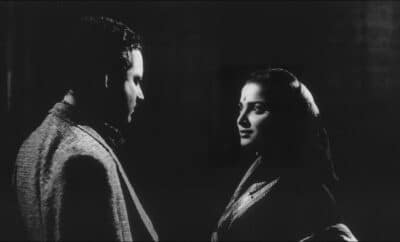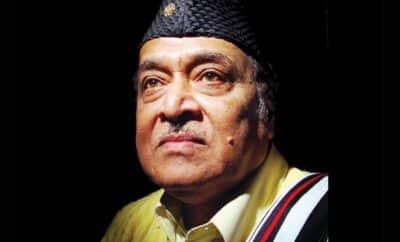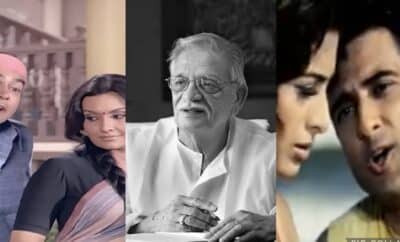Collections
The Repeat Value of Nasir Hussain Songs
Long time ago, I watched a serial on Doordarshan (I don’t remember its name, actors, main story or anything about it) where in one of its episodes they show that the lady of the house cooks a simple meal everyday and serves it on the table for the family. But the family members get bored of the simple meal and refuse to eat. Instead they start ordering the food from outside and pamper their taste buds. One fine day the lady serves the same home cooked food but presents it in a gourmet style, gives each dish a stylish name and informs that it was from a certain 5 star hotel. She repeated this practice by serving the same home cooked food but plating it differently and giving fancy names to it. The family is thrilled and they eat everything to their heart’s content. So, did the lady fool them? No, she just wants her family to eat healthy, stay healthy and stay happy.
The episode, somehow, reminds me of Nasir Hussain films. It is not just about his lost and found story. It is also about the song situations, the construction of the overall song and the way it is presented to the audience. It would be wrong if someone says that he has been fooling the audience. Instead, he has been entertaining the audience with the breezy romances. He recycled the themes, put some fantastic music into it, seasoned it with eye pleasing picturisation and served it as new to the audience. His films, especially his songs have a great repeat value. Some of his films and songs have become a benchmark for the other directors, writers and producers in the industry.
A small journey into Nasir Hussain’s recycled, benchmarked songs –
What’s the situation? A girl and a boy travelling in an open jeep through the hilly area, tall trees and the snake like roads. The girl is sulking or pretends to be sulking. The boy is, of course, teasing her. And since it’s a road trip, the song also should be about the travel, the travellers and love!
Munimji (1955), though not directed or produced by Nasir Hussain, it was written by him. And he repeated quite a few elements from this film to his other films. Dev and Nalini Jaywant travelling in a jeep and we have a song situation here.
Shifting the focus now to his 2nd directorial venture, Dil Deke Dekho (1959). The song situation remains the same or rather it reminds us of the above number.
Oh there’s a small amount of whistling too in both the songs.
What’s the situation? The girl and the boy almost want to impress each other. They become competitive. So the situation is – both will sing a song, try to impress the villagers in the field and impress them so much that they will come and join you.
Dil Deke Dekho (1959) – Shammi Kapoor sings and Asha Parekh sings. It’s a competition, remember? We have twin songs here – Megha re bole ghanan ghanan and Bade hain dil ke kaale –
Pyar ka Mausam (1969) – 10 years after Dil Deke Dekho, he repeats the situation. Asha Parekh also remains. The hero changes from one naughty Kapoor to another handsome Kapoor (Shammi to Shahsi). The beginning hoooo hoooo by the inimitable Rafi also remains the same in both the songs.
The girl and the boy have met, they have competed and impressed each other. Now is the time to come closer and check the love compatibility. Oh but they don’t have the courage to say things openly to each other.
What’s the situation? The girl and the boy are under the influence of alcohol/narcotics and expressing their love for each other.
Jab Pyar Kisise Hota Hai (1961) – Asha Parekh and Dev are under the influence of Bhang! Love galore amidst the hills and fog.
Caravan (1971) – A difference of 10 years again and we have Asha Parekh and Jeetendra under the influence of alcohol. Again love galore amidst the hills and fog.
Both the songs also focus on the eyes, by the way.
Zamane ko Dikhana Hai (1981) – This song can also be added to the above category.
What’s the situation? The girl and the boy have expressed love to each other but now they have to declare it to the world. What can be more helpful than a stage and a qawwali!!?
Hum Kisise Kam Nahin (1977) – Zeenat Aman and Rishi Kapoor advertising their love for each other in front of the big, bad world.
Zamane ko Dikhana Hai (1981) – Rishi Kapoor again wants to show off his love, this time for Padmini Kolhapure.
What’s love without any tiff or squabbles? There has to be that roothna manana element between the girl and the boy.
What’s the situation? Now the boy is sulking and the girl is placating.
Tumsa Nahin Dekha (1957) – Shammi Kapoor is upset and intends to distance himself from Amita. Amita on the other hand is persuading him to stay.
Teesri Manzil (1966) – Again Shammi Kapoor is upset, this time with Asha Parekh while she’s gloriously cajoling him.
Teesri Manzil, though not directed by Nasir Hussain, it was produced under his banner and is very much a Nasir Hussain film.
Mohammed Rafi joins in the last stanza of both the songs which otherwise is dominated by Asha Bhosle.
Now we go the other way round. Tiffs and squabbles continue.
What’s the situation? The girl is upset and the boy is persuading.
Hum Kisise Kam Nahin (1977) – Rishi Kapoor trying to persuade the miffed Kajal Kiran.
Zabardast (1985) – Another Kapoor, this time Rajiv, persuading an annoyed Rati Agnihotri.
Both the songs also have school students doing the mass drill with the help of bagpipes in the background.
There’s also a situation where both are taking turns in roothna-manana.
Yaadon ki Baraat (1973) – Vijay Arora goes around apologising first and Zeenat Aman following the charade.
If that wasn’t sufficient, we have Nasir Hussain repeating several versions of the songs – Yaadon ki nikli hai aaj dil ke dwaare and Tum bin jaun kahan throughout the respective films.
But we as the audience aren’t complaining, Nasir sahab. As they say, there’s no harm in repeating a good thing.




gandhivp
March 13, 2024 at 9:01 pm
Deepa Ji,
Thank you for sharing your insightful thoughts on Nasir Hussain’s films and their enduring impact on audiences. Your analogy of the lady serving home-cooked meals in a gourmet style beautifully captures the essence of Hussain’s approach to filmmaking, emphasizing the importance of presentation and entertainment value.
His ability to recycle themes, infuse fantastic music, and craft visually appealing scenes has indeed left an indelible mark on Indian cinema.
Gandhi Vadlapatla
Deepa
July 23, 2024 at 1:14 pm
Thank you. Glad you liked it.
Pratik Majumdar
May 9, 2024 at 11:14 am
What a lovely write up on the maestro of breezy musical romance. Nasir Husain was the veritable creator of this genre and an undisputed master at it. The song selections for each theme and placing different songs from similar situations in his different films showcase the true genius of Nasir Saab. He could tell the same story many different times in many different ways and make it appealing each time. The songs selected and highlighted in this brilliant write up is living proof of it.
Deepa
July 23, 2024 at 1:15 pm
Thank you. Nasir Hussain films have been a staple diet for cinema and music lovers equally.
sundeep pahwa
May 21, 2025 at 9:07 am
Thats the reason I always refer to Nasir Hussain The Greatest Entertainer of Hindi Cinema Koi Shaque